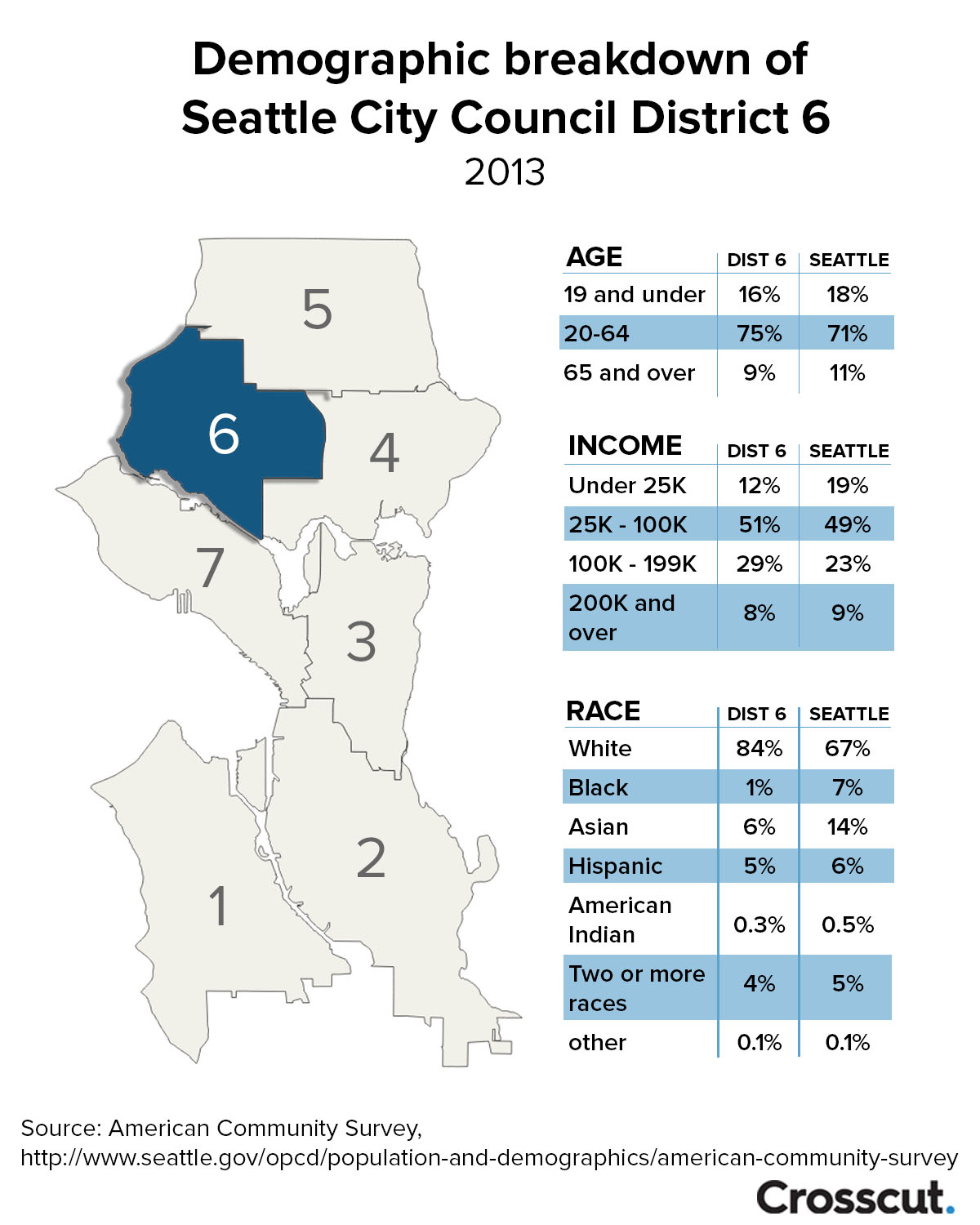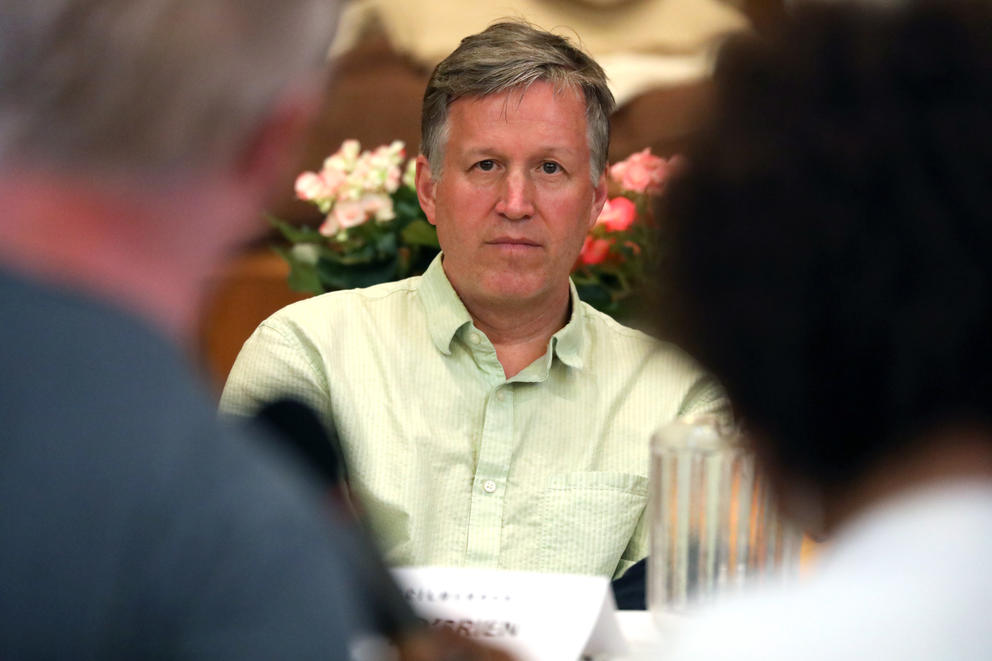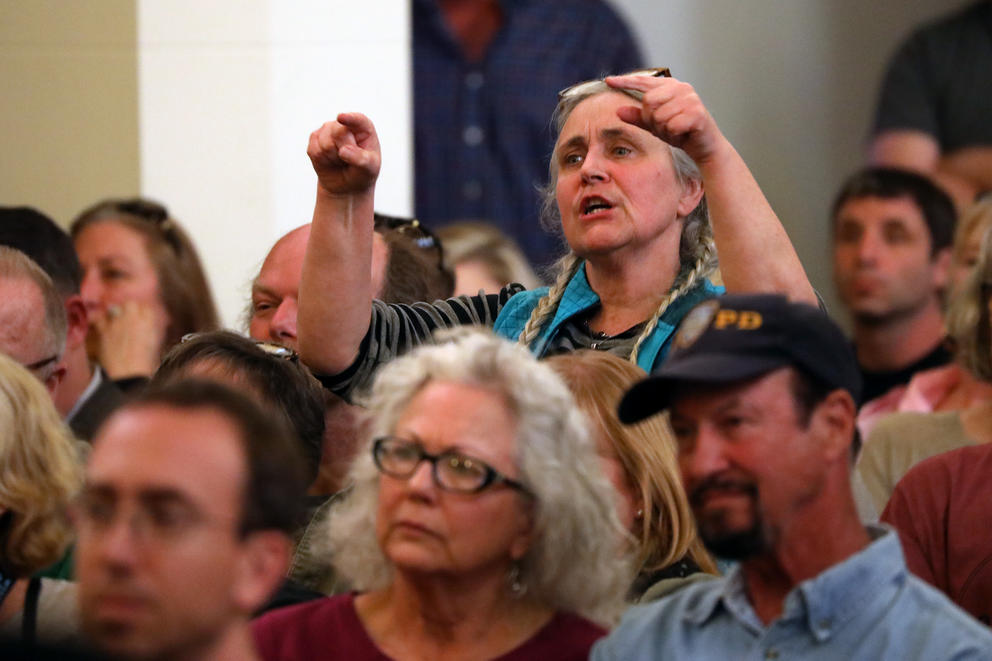So he turned to the outrages of young people of color and listened to their growing opposition to the jail. What he heard made him realize, if his boys were Black or Brown, his entire mindset would be different.
So as the rest of City Hall quieted for the holidays, O’Brien went public with his opposition, knowing well it would frustrate his colleagues who seemed to believe the new facility was beyond the point of turning back.
It’s actions like that one that garner admiration for Mike O’Brien from fans who regard him as principled and keenly aware of his purpose as a councilmember. His opponents, meanwhile, deride him for these same political actions, which they view as “virtue signaling” and impractical.
Now as the city comes to a boil over homelessness, housing and transportation — and whether to tax large businesses to raise money to combat the city’s problems — O’Brien has emerged as a central figure to castigate. In part, the ire he’s attracted is rooted in that same operating procedure that spurred him to oppose the jail: He’s never shy about stepping forward on an issue, but you may not like what he’s going to say.
As a result, he could already make a strong case for 2018’s most hated man in Seattle — if not in numbers, certainly in volume and aggression by those who despise him.
Last week, at a town hall meeting in Ballard, men and women turned red in the face shouting O’Brien down. He was one of two original sponsors of a proposed $500 per employee tax on large businesses to build more housing.
A group of residents in O’Brien’s district (District 6 — Ballard, Fremont, Wallingford) has been increasingly vocal and growing in size. The controversy surrounding the tax, however, sent them through the roof. At the town hall, neighborhood residents sneered at him, telling O’Brien to invite the homelessness into his house. They waved “Listen to Us” signs, crying “Bullshit” as O’Brien tried to explain why he thought the tax was necessary.
A petition for O’Brien to step down from the council has gathered more than 2,500 signatures. One man has begun making “Recall Mike O’Brien” stickers — with a sort-of Andre the Giant stencil of O’Brien’s face — plastered to light poles and street signs. The Facebook page for the recall campaign has nearly 500 likes.
On Friday, at a party marking the opening of the new Nordic Heritage Museum, O’Brien was forced to leave by the manager of the Pacific Shipyard, Doug Dixon. Dixon, in an interview, said he could not abide O’Brien’s stance on a new bike trail near his business or his approach to homelessness. He accused him of having “mental issues,” calling O’Brien and his wife “sick.”
It’s a jarring contrast to a man known throughout City Hall as highly pleasant to see every day. Ask about how the councilman is behind council doors or whenever he’s not in public and people say: He’s nice. Even during periods of disagreement, council staffers agree he never gets personal. He does not hold grudges. “Everybody likes Mike,” said one person in the council’s second-floor offices.
And yet, the anger unleashed by tent encampments, zoning changes and government spending, targets him.
O’Brien, 50, won his first election in 2009 after working as chief financial officer for a law firm. He’s been re-elected twice, including in a 2015 landslide. In his time in office, he’s gained a reputation as one of the most ideologically driven council members, second only to Kshama Sawant.
His more recent re-election came just days after the city and the county declared a State of Emergency on homelessness. The declaration signaled how the growing number of people on the streets would become government’s number one priority.
 And yet, the homelessness problem has only gotten worse. Last year, the county estimated nearly 12,000 people were living in shelters or on the streets. Nearly 70 people have already died on the streets in 2018. Encampments now dot greenbelts and parks in a way they never did back in 2010.
And yet, the homelessness problem has only gotten worse. Last year, the county estimated nearly 12,000 people were living in shelters or on the streets. Nearly 70 people have already died on the streets in 2018. Encampments now dot greenbelts and parks in a way they never did back in 2010.
All of this comes as housing prices continue to rise, alienating the better part of a generation from ever owning a home in the city. It comes as traffic snarls. And it comes as residents regard whether Seattle is too tax-happy — and if they’ve been taxed enough.
The proposed new tax on business to fund more housing has drawn battle lines — literally dividing last week’s Ballard town hall meeting into two camps of speakers, for or against.
All of this is to say, Seattle has reached a boiling point.
“I think it’s never been more divided,” said former Mayor Mike McGinn. “You’re seeing really powerful sentiments nationally and that’s reflected locally, particularly on inequality. Then you add in our own local factors: the amount of growth without an appropriate policy response and the growing homeless problem without an appropriate response.”
Former Mayor and Councilmember Tim Burgess feels the same. “I do think that the public’s frustration with City Hall is acute.”
There are nine council members and one mayor governing the city. Much of the council and even some unelected advocates are fielding indignation on social media and through email. They cannot post anywhere, it seems, without meeting the masses.
But of all the targets, O’Brien’s seems to be the largest. "Mike gets the brunt of that because he’s so out front," said Burgess.
In some regards, O’Brien has been the most aggressive elected official on homelessness. In 2016, he proposed defining certain areas of the city as low-priority for encampment removal. The suggestion set off a firestorm among people who believed it was a license to camp anywhere.

Last year, he similarly proposed loosening enforcement of minor parking violations, an attempt to cut down on fining people living in their cars. That too was pilloried.
And last fall, he and former Councilmember Kirsten Harris-Tally introduced the proposed business tax.
John Wisdom with Speak Out Seattle, a group that opposes O’Brien’s policies, said he regrets his 2015 vote for him and doesn’t plan to repeat the decision if O’Brien runs in 2019. The councilmember’s proposal to deprioritize cleaning up some encampments drove him crazy.
“He’s looking at homelessness as a civil rights cause,” he said. “I think it’s a lot more complicated than that.”
And where constituents may once have blamed the entire council, with the 2015 introduction of district representation, they can now blame their own councilmember for perceived failures in the city.
“I think it’s an amazing period in terms of this deep divide between elected officials and the everyday working people of Seattle,” Wisdom added. “Because of this homeless issue, people have really woken up.”
Burgess echoed the point. “On the areas of the camping stuff, the unauthorized encampments or homelessness in general, you’re getting really close to how people live their lives on a day to day basis…. People have a visceral response to that and I think Mike has not appreciated that perspective as perhaps he should.”
But what some perceive as a lack of empathy is seen by others as doing what needs to be done.
“Mike O’Brien tried to step in and make it work,” said McGinn. “He could have done what council members have done forever which is just sit back and criticize and not step in and try to solve it…and then use that as a swing board on trying to run for office. But Mike didn’t do that.”

For Lisa Daugaard, Director of the Public Defenders Association, the proposed new business tax is a dose of reality — a step toward a funding amount she believes is necessary to actually slow the homelessness crisis. And that truth, she argued, can be hard to swallow.
“[Council members] are not pandering. They’re not invoking the old fake solutions, nor are they particularly participating in new fake solutions. They are being serious about moving the needle and those answers are not what people want to hear.”
Of O'Brien specifically, she said, "There are times when he just explains himself when it might be safer to manipulate public sentiment and he doesn’t do that. I think that that can mean that he makes himself more vulnerable because he doesn’t protect himself as some others who are more committed to their own political future."
City council members negotiate offices according to seniority. After more than 8 years on the council, O’Brien’s corner office looks both west toward the water and north up Third Avenue. His office is bathed in natural light.
It’s been a jarring few weeks for him and his staff as the council zeroes in on a final vote next week on the employee hours tax on large businesses. The opposition has been intense, both Amazon and Zillow threatening to hire elsewhere and slow down some of their own downtown construction projects.
Last week’s town hall, just miles from where he lives, was painful.
“It was pretty rough,” he said in an interview on Tuesday.
O'Brien often jokes in person. During a largely subdued 30-minute interview, he managed one lighthearted moment. Referring to the tense political environment, he said: 'I actually talked to Seattle Public Utilities; it's the water."
“I’ve been in a number of meetings where there's been a lot of angry voices and yet [last] Wednesday still kind of stood out in a way that feels like if someone was measuring these things, it's like, oh yeah, we just moved the bar again,” he said.

O’Brien is confident he is still basically the man he was when he was first elected. He ran on climate change and social justice and, he pointed out, those are issues he’s worked on while in office.
“I feel pretty comfortable that there was no bait and switch here. I am doing the things I've been saying I wanted to do all along.”
His one-time colleague Tim Burgess agreed.
“He was consistent the whole time,” he said.
So what’s changed?
O’Brien said he’s been mulling this question. “I spend a fair amount of time thinking about what's the dynamic, what's happening and what's my role in this? Did I help create this? How do I respond to this?”
His best answer: poverty is no longer at arm’s length for the homeowners in his district. Alongside the landscapes of wealth in the city are homeless tent encampments. After they’ve left home to go to college, O’Brien figures members of his sons’ generation may not be able to return to start lives here.
And the problems known well among communities of color are creeping north to his district. “I think there's a lot of folks like myself, as a White man, that are starting to feel like, 'Whoa, I'm not sure if I can even hold my own anymore.'”
“I don't think my values have shifted," he added. "I don't think my covenant is shifted. But I think the reality that we're all facing is all of a sudden really different.”

In facing that new reality, O’Brien said people like him — a White homeowner — are well represented by the virtue of his being on the council. But who’s not represented are the people living on the streets or, as was the case with his opposition to the youth jail, those most likely to end up on the inside. O’Brien feels a particular pull toward bringing those people to the table.
For O’Brien’s supporters, like Dae Shik Kim Hawkins of the Seattle Peoples Party, such self-awareness is rare and appreciated. “I’ve always seen Mike posture himself where he knows at the end of the day he’s a middle-aged White guy in a position of power,” he said.
But it also has the effect of making the homeowners of his district — the people who look a lot like Mike O'Brien — feel unheard. “People criticize him for virtue signaling,” said Wisdom of Speak Out Seattle. “He sort of blows in the wind with what he sees as what he thinks are the most progressive ideas of the day.”
Once upon a time, Mike O’Brien felt there was a way to bring opposite sides together.
“I always felt like there was a place where we can work through the issues and nuance actually kinda matters and we can talk about trade offs and we could figure out a position that's gonna mostly work for everybody,” he said.
But that’s evaporating, he said, replaced by an environment where only the loudest voices are heard. As a result, the quieter, more nuanced voices are being crowded out, he said, and that threatens the mission of City Hall to serve everyone.
“I've always thought, I’m not worried about democracy in Seattle. We're going to be fine. It's the rest of the country that terrifies me,” he said.
“But you know, the things that have happened in the last few weeks, I am worried.”



